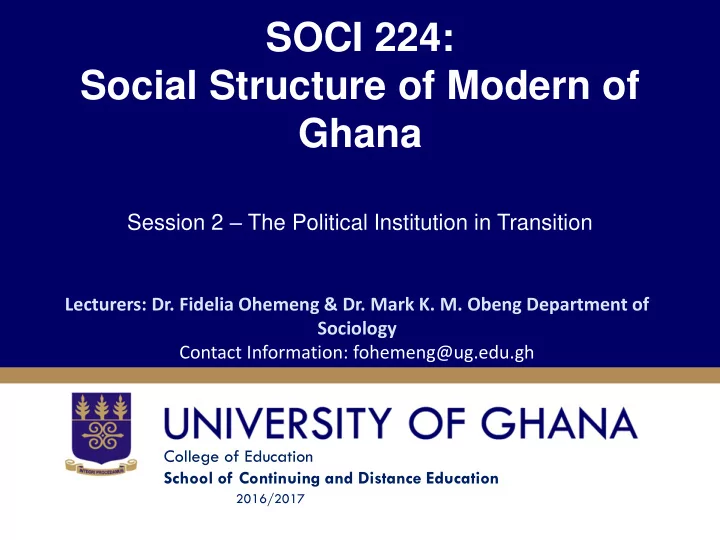

SOCI 224: Social Structure of Modern of Ghana Session 2 – The Political Institution in Transition Lecturers: Dr. Fidelia Ohemeng & Dr. Mark K. M. Obeng Department of Sociology Contact Information: fohemeng@ug.edu.gh College of Education School of Continuing and Distance Education 2016/2017
Session Overview The first institution to be affected by colonialism is the traditional political system. This session describes how traditional rulers were impacted by colonialism. It also discusses the new form of political system which is the Local Government system. Slide 2
Session Outline The key topics to be covered in the session are as follows: • The nature of the change in the traditional polity • The local government system – the rational behind it – components • Functions of the various components – The Regional Coordinating Councils – The District Assemblies Slide 3
Reading List • Abotchie, C. (2016). Social Change in Ghana . Accra: Hans Publications. Chapter 2 • Nukunya, G. (2014). Tradition and Change in Ghana: an Introduction to Sociology . Accra: Ghana Universities Press. Pages 133-136 Slide 4
Topic One THE NATURE OF THE CHANGE IN THE TRADITIONAL POLITY Slide 5
The Nature of the Change in the Traditional Polity • The Chiefs lost their independence in every respect • They lost almost all their functions. These are: – Military: could no longer wage war against other ethnic groups – Legislative & Administrative powers: could not make laws. They were however allowed to make by-laws • Interpretation of Customary Laws Subject to cadres of PNDC/ DAs Slide 6
The Nature of the Change in the Traditional Polity – Judicial: colonial courts were established, prisons – Chiefs could pass bye laws on 15 subjects only (Amenumey, 1964) – Economic: lost their monopoly over important trade routes and commodities Slide 7
The Nature of the Change in the Traditional Polity • The only functions being performed by the chiefs: • Cultural- persistence of the traditional criteria for selection of chiefs • Religious – As occupant of ancestral stools Slide 8
Sample Question • In view of the fact that chiefs have lost almost all their functions, discuss the view that chieftaincy should be abolished in Ghana Slide 9
Topic Two THE MODERN POLITICAL SYSTEM: THE LOCAL GOVERNMENT STRUCTURE Slide 10
The Local Government Structure • The Modern Political system is made up of the – Central government – Local government system • The Local Government System • Promulgated in 1988 (PNDC Law 207) • Main rational is to diffuse government business to the local people and allow local people to participate in governance and development Slide 11
Components of the Local Government Structure • This is a three tier system made up of the: – Regional Coordinating Council (RCCs) – District/Municipal/Metropolitan Assemblies (MMDAs) – Town, Area Councils and Unit Committees (TACUCs) Slide 12
The Regional Coordinating Council • The Regional Coordinating Councils (RCCs) consists of Regional Ministers, Government appointed persons as chairmen, all presiding members of the MMDAs, all Deputy Ministers and all District Secretaries (DCE/MMCEs) • The roles of the RCCs includes coordination and formulation of the integrated plans and programs of the MMDAs in order to harmonize these programs with the National development policies approved by the government. Slide 13
Composition of the MMDAs • The MMDAs consists of the: – Metropolitan Chief Executive (MCE)/Municipal Chief Executive (MCE)/District Chief Executive (DCE) – Presiding Member, who is a government appointee – 2/3 of elected members – 1/3 members nominated by the government. Slide 14
Topic Three FUNCTIONS OF THE MMDAS Slide 15
Functions of the MMDAs • The overall development of the districts and ensuring the preparation and submission of development plans and budgets to the government for approval • The formulation and strategies for effective mobilization of human, physical, financial and other resources • Engagement of trade, industry or commerce for development Slide 16
Functions of the MMDAs • Maintenance of public works and services • Cooperation with national security to provide security for the district • Construction and rehabilitation of new social and developmental infrastructure. Slide 17
Town, Area Council and Unit Committees (TACUC) • The TACUC is the third component of the Local Government Structure • These are yet to be established fully; their establishment is based on need • The MMDCs should make recommendations to government for approval Slide 18
Some Preliminary Achievements • Awakening of the political consciousness of the MMDAs at the primary school level • Expansion of infrastructural facilities at the district level • Expansion of markets/lorry parks, etc. • Construction of schools and rehabilitation of old one Slide 19
Recommend
More recommend